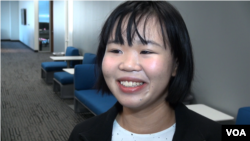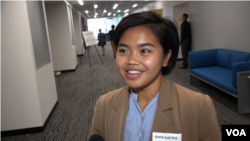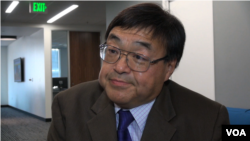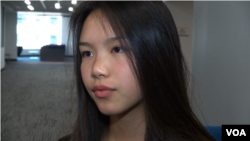Asian Americans are moving toward the Democratic Party, according to recent surveys, but Asian community leaders in Los Angeles say neither Democrats nor Republicans are doing a good job in attracting Asian voters, who share common concerns but are nonetheless divided by age and country of origin. The leaders were responding to the release of new data that highlights the concerns of Asian voters.
The survey of Chinese, Japanese, Korean and Philippine Americans in Los Angeles, released Wednesday, shows that Asian “millennials,” age 18 to 29, are mostly US-born and are highly proficient in English. They get their news from English-language media, much of it online.
Differences due to age
The poll shows that older Asian voters are mostly foreign-born and get their news from foreign-language media. To reach both groups, community leaders say the parties should use appropriate forums, and also find Asian candidates for office, since Asian American voters often cross party lines to support candidates who share their ethnicity. “Asian Americans across the board support someone from their own community to represent them,” said business owner Charlie Woo, who chairs a community empowerment group called CAUSE. He was one of the leaders present for release of the findings.
Younger Asians in the survey are “extremely liberal on social issues,” said Raphael Sonenshein, executive director of the Pat Brown Institute of California State University, Los Angeles, which conducted the survey, “especially an issue like gay marriage,” he said.
Immigration reform, reproductive rights and gun control are on the agenda of Kat Alvarado, a Philippine American student at Cal State Los Angeles who considers herself “left-leaning” but politically independent.
Student Elise Dang says her friends talk politics on Facebook and that most, like her, are liberal. She says her conservative friends often spark lively discussions, however, “since most of their friends don’t agree with their political views.”
Political parties not reaching Asian Americans
Charlie Woo of CAUSE says that the study shows that only one in three Asian Americans voters have had direct contact with their elected officials, highlighting another gap in political outreach. “I think the parties have been making a mistake not paying attention,” he said.
Many older immigrants need encouragement to vote, said David Ryu, the first Korean American elected to the Los Angeles city council. “Whenever I volunteered on campaigns and we did phone banking in (the Korean) language, we used to get skyrocketing numbers of ‘yeses.’ And many of the campaigns thought, ‘How is this possible?’ It’s because no one ever told them to vote!”
Ryu said voter turnout for his election last year was just 16 percent. “For Asian Americans, Korean Americans, it was about 40 percent,” he said.
Asian Americans will make up more than one in 10 California voters by the presidential election November 8th, and they are the fastest-growing minority nationally.
Political outreach should vary by age and community, these leaders said as they reflected on results of the latest survey. Older Asian Americans, who are still the majority of active Asian voters, can be reached through traditional broadcast and print media, and in the case of recent Chinese and Korean immigrants, through foreign-language outlets. They say that older Asian voters can also be reached through their religious organizations. Young voters, less religious and more technologically adept, are best addressed through English websites and social media.
Less involvement in community
College student Hannah Hsieh said that reaching Asian Americans like her can be a challenge, since many are focused on academics and career “because it’s just part of our culture,” she said, “and as a result… we don’t become as involved in the community.”
That is likely to change, said analyst Sonenshein, who predicts that young, liberal Asian voters will become more involved in civic affairs as they get older, to make their mark in politics in Los Angeles.














